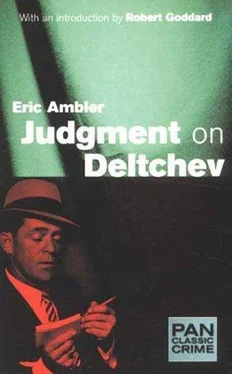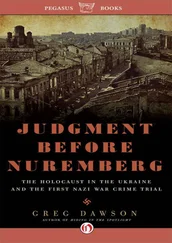Eric Ambler - Judgment on Deltchev
Здесь есть возможность читать онлайн «Eric Ambler - Judgment on Deltchev» весь текст электронной книги совершенно бесплатно (целиком полную версию без сокращений). В некоторых случаях можно слушать аудио, скачать через торрент в формате fb2 и присутствует краткое содержание. Год выпуска: 1977, ISBN: 1977, Издательство: Vintage, Жанр: Криминальный детектив, на английском языке. Описание произведения, (предисловие) а так же отзывы посетителей доступны на портале библиотеки ЛибКат.
- Название:Judgment on Deltchev
- Автор:
- Издательство:Vintage
- Жанр:
- Год:1977
- ISBN:9780307049971
- Рейтинг книги:4 / 5. Голосов: 1
-
Избранное:Добавить в избранное
- Отзывы:
-
Ваша оценка:
- 80
- 1
- 2
- 3
- 4
- 5
Judgment on Deltchev: краткое содержание, описание и аннотация
Предлагаем к чтению аннотацию, описание, краткое содержание или предисловие (зависит от того, что написал сам автор книги «Judgment on Deltchev»). Если вы не нашли необходимую информацию о книге — напишите в комментариях, мы постараемся отыскать её.
Judgment on Deltchev — читать онлайн бесплатно полную книгу (весь текст) целиком
Ниже представлен текст книги, разбитый по страницам. Система сохранения места последней прочитанной страницы, позволяет с удобством читать онлайн бесплатно книгу «Judgment on Deltchev», без необходимости каждый раз заново искать на чём Вы остановились. Поставьте закладку, и сможете в любой момент перейти на страницу, на которой закончили чтение.
Интервал:
Закладка:
Then came the incident of ‘Deltchev’s football match’.
The occasion was the official opening of a sports stadium. It had been completed in 1940 and immediately requisitioned for use by the German Army as a transit camp. Later the Red Army had used it as a garrison headquarters. Its return was a gesture of Soviet goodwill, which the new government had dutifully decided to celebrate with as much publicity as possible. It was probably the presence of Western diplomatic representatives at the ceremony that determined that Deltchev as leader of the ‘opposition’ should be asked to speak.
He began, deceptively, with a tribute to the Red Army and expressions of his party’s recognition of the generous motives that had prompted the early return of the stadium. He hoped that in the near future it would be the scene of a memorable football match with the local Red Army team.
Then, during the mild applause that greeted this suggestion, he moved nearer to the microphones. But this time he took no manuscript from his pocket. He knew exactly what he wanted to say.
‘But meanwhile, my countrymen, there is another, more deadly battle for us to fight — the battle for freedom within the state.’
He paused. There was a silence, in which the long banners could be heard flapping in the wind. He went on.
‘Two days ago I was invited by the leader of the People’s Party, Petra Vukashin, to take the office of Minister of Justice in the government that now has power. My answer was promised for tonight. I take this opportunity of giving him the answer now. I answer that if he thinks that by so betraying my brothers in the Agrarian Socialist Party I should change in any way their determination to fight until this new tyranny is utterly destroyed — if he thinks that, then he is stupid. If our opposition to his party’s criminal plans is such that he must try to buy us off with a share of the loot, then he is also frightened. My countrymen, there is no time to lose. These stupid, frightened men are dangerous, not for what they are now, but for what they mean to become — your masters. They are not …’
At this point the booming public-address system in the stadium was cut off. In the deathly pause that followed, Deltchev’s voice, high and thin in the wind, could only be heard by those near him as he completed the sentence.
Then the cheering began. It came across the packed stadium as a rolling, sighing wave of sound that surged up and broke with a roar that shook the air like an explosion. It lasted nearly a minute and subsided only when another sound came to replace it: the steady, massive chanting of Deltchev’s name. Suddenly on the far side of the stadium there was a wide swirling movement in the crowd as a fight developed, and from closer at hand there was angry shouting. Deltchev, who during the cheering had stood motionless in front of the dead microphones, now waved his hand and turned away. There was another tremendous cheer and more shouting. At that moment the officer in command of a Russian military band, which had been waiting to lead into the arena the squads who were giving the gymnastics display, decided not to wait for an order to do so. It was a sensible decision and probably averted serious trouble. As the band began to play and march in, the cheering became ragged and in places gave way to laughter and clapping. In less than a minute the incident of ‘Deltchev’s football match’ was over; over, that is, except for the breathless excitement of discussing it and of reporting it to those who had merely heard it on the radio. But nothing about it was forgotten and much that had not happened was remembered. ‘Papa’ Deltchev had come back to them. He had spoken his mind and they had shown that they were with him in his fight against the ‘masters’.
Four nights later an attempt was made to assassinate him.
His house was of the old kind with a walled courtyard. As he got out of his car to enter the house, a grenade was thrown. It hit the wall by the entrance and bounced back into the road before exploding, so that Deltchev, who had gained the doorway, was partly shielded from the blast. There were few people about at the time and the man who had thrown the grenade escaped.
The driver of the car was badly cut about the head and neck, but Deltchev, although he had been flung against the half-open door and much shaken, was not seriously hurt. In the ensuing confusion, however, his protests that the pain in his shoulder was caused only by a bruise were ignored and he was taken to a hospital with the driver. Within an hour rumours that he was dead or dying were circulating in the cafés, and a large crowd gathered outside the hospital. By this time Deltchev had returned to his home, where the police were collecting fragments of the grenade in the presence of an even larger crowd. There was a great deal of hostility toward the police.
It is said that when the Chief of Police reported to Vukashin later that night that the attempt on Deltchev was being described openly as the government’s reply to the stadium speech, the Minister exclaimed, ‘Did they think we would reply in the chamber?’ The story may be untrue, but, in the light of what followed, it is not incredible. Certainly from that moment on there was an ominous change in the Propaganda Ministry’s public attitude toward Deltchev, and it is likely that the decision to try him was made at this time. The Ministry’s official statement on the affair had a sort of angry jocularity about it that did nothing to change the general belief that the government had known of the attempt in advance. It asserted that the grenade was of American manufacture, and went on to suggest that the obvious place to seek the criminal was in the ranks of Deltchev’s own party, where there were many criminals with Anglo-American imperialist connections.
The editor of a newspaper that described this statement as ‘unsatisfactory, but significantly so’, was immediately imprisoned. A series of savage attacks on the Agrarian Socialist Party now began. Their violent tone and the barely concealed threats that accompanied every allusion to Deltchev conveyed unmistakable warnings. The opposition had become intolerable and was going to be liquidated; but first Deltchev must be disposed of. He had a choice. He could escape abroad and be condemned or stay at home and be condemned. In any event he would be condemned.
Deltchev chose to stay. A month later he was arrested.
That was all. For a while I looked out of my hotel window across the flat roofs and Byzantine spires of the city, as still in the moonlight as the landscape of a dead world; and at last I became sleepy.
As I collected up the mass of news cuttings, notes, and manuscript that composed Pashik’s file and began to put them back in the envelope, I noticed a paper that I had not seen before. It had been clipped to the back of a wad of sheets with cuttings pasted on them and therefore easily overlooked.
It was a page from a memo pad I had seen on Pashik’s desk. On it was typed, ‘Case of K. Fischer, Vienna ’46 — Aleko’s hand?’
For me, then, it was not the most interesting thing about the file. I went to sleep.
CHAPTER FOUR
Pashik had promised to drive me to the trial, and we met for breakfast. He nodded at the envelope I was carrying with the approving smile of a friendly schoolmaster.
‘Ah, Mr Foster, you have been reading.’
‘Yes. There’s a lot of material there. Did you collect it?’
He fingered his chin self-consciously for a moment; he had shaved. ‘Why do you ask, Mr Foster?’
‘Because a lot of the unpublished stuff was obviously done by someone who knew Deltchev very well and liked him. You?’
‘Ah, the memoir.’ He looked embarrassed. ‘That was commissioned by one of my papers from Petlarov.’
Читать дальшеИнтервал:
Закладка:
Похожие книги на «Judgment on Deltchev»
Представляем Вашему вниманию похожие книги на «Judgment on Deltchev» списком для выбора. Мы отобрали схожую по названию и смыслу литературу в надежде предоставить читателям больше вариантов отыскать новые, интересные, ещё непрочитанные произведения.
Обсуждение, отзывы о книге «Judgment on Deltchev» и просто собственные мнения читателей. Оставьте ваши комментарии, напишите, что Вы думаете о произведении, его смысле или главных героях. Укажите что конкретно понравилось, а что нет, и почему Вы так считаете.












